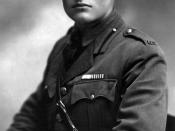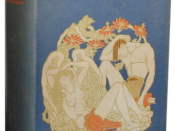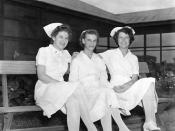War reports--both fact and fiction--have fascinated people since the first warriors and bards that sat around campfires. Not all war literature is based on firsthand experiences, so some comes out of peoples? imaginations. One of America?s most prominent war novelists, Stephen Crane, wrote about war before he ever saw battle. Crane?s short novel The Red Badge of Courage, about a young soldier?s reactions to fear during a major Civil War battle, was written almost thirty years after the battle took place.
Many of Ernest Hemingway?s novels and stories were based on his own experiences during World War I. Before the US entered the war, Hemingway worked as an ambulance drive for the Italian army. His novel A Farewell to Arms, often called his most important novel about World War I, follows the experiences of a young ambulance driver.
After World War I, writer John Hersey introduced a journalistic technique to war friction.
His book Hiroshima describes the effect of the A-bomb, and combines the literary techniques of fiction with the factual style of journalism. The Vietnam era produced several notable works of fiction, including Ron Kovic?s Born on the Fourth of July. Kovic, a Vietnam veteran, describes how his feelings about war changed after he lost the use of his legs.
Recently, even historical books have been influenced by fictional and autobiographical accounts of war. Citizen Soldiers, a history of World War II, recounts the experiences of ordinary soldiers in the field, instead of focusing on the personalities of the generals or on battle strategies. Stephen E. Ambrose, the author of Citizen Soldiers, is able to provide gut-wrenching details usually found only in novels or memoirs. He gathered much of his material from the oral history accounts of soldiers who fought in the trenches.
Memoirs of war also...


